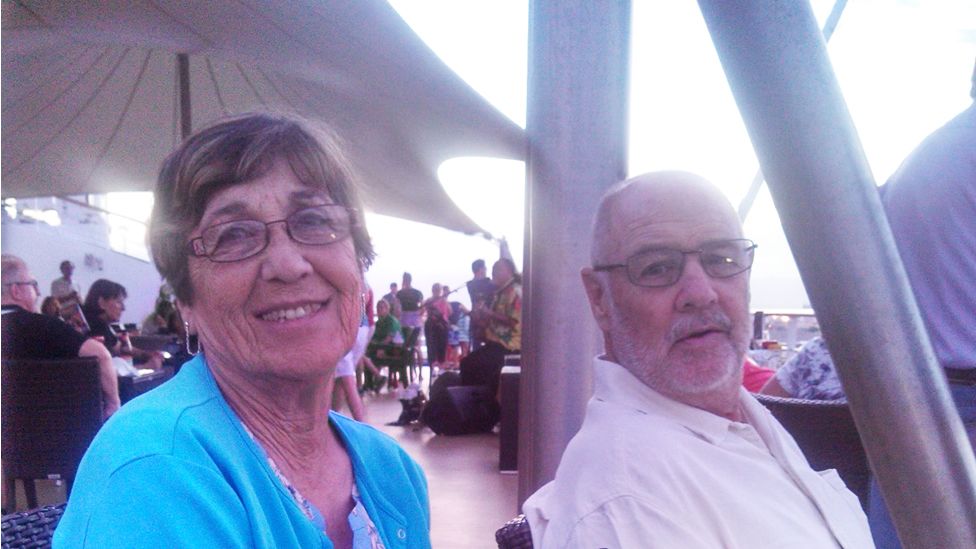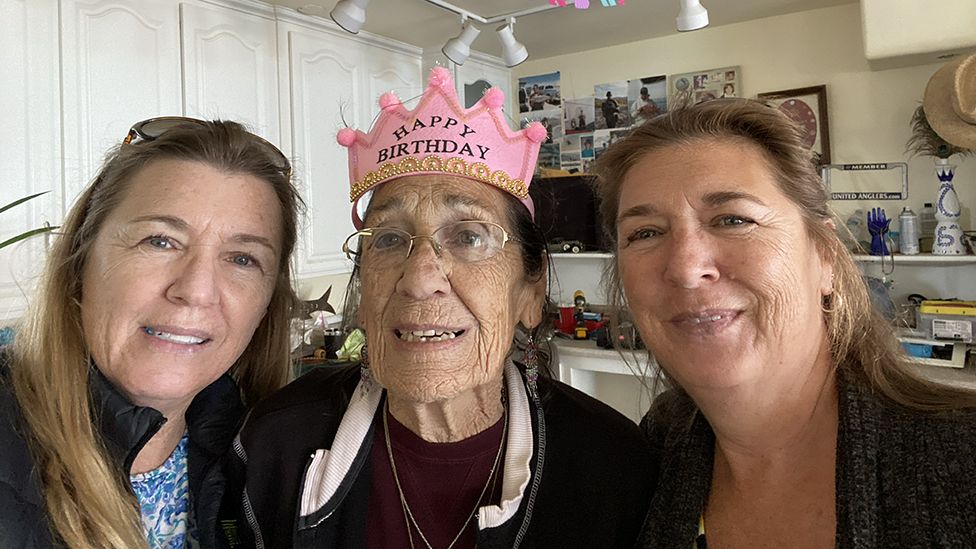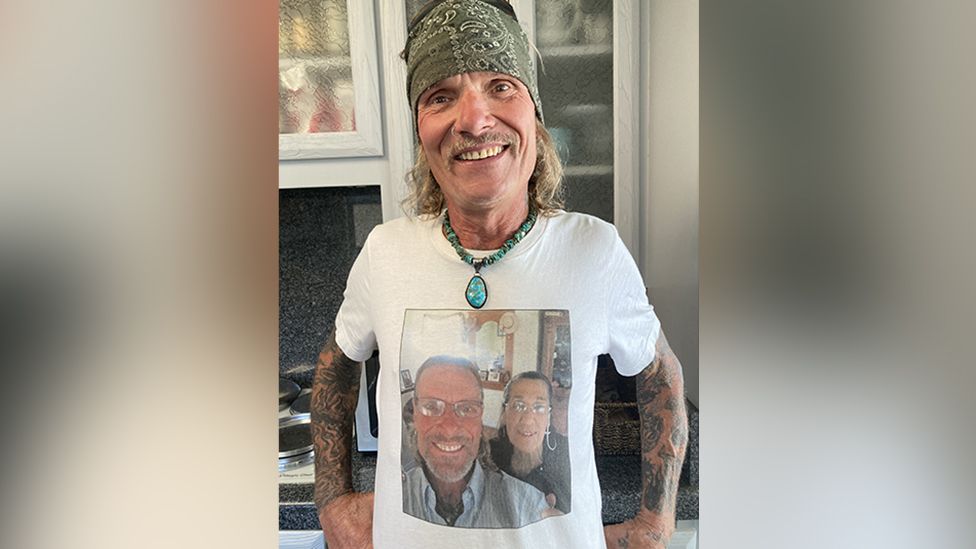
A homeless man moves in with a much older wealthy woman – is it a genuine love story, or something much darker?
Carolyn Holland was a wealthy widow aged 80, living in the idyllic Californian beachside resort of Cayucos, when she met David Foute, a man 23 years her junior.
He came to do some odd jobs for her. Within weeks, they were a couple, declaring their undying love.
Carolyn said she’d never expected to fall so deeply in love with a stranger or to be having a romantic, sexual relationship at her age: “He’s given me something special, because of his caring spirit. We share a lot. I love his personality, and I hate it when he’s gone.”
“I’m going to take care of her as best I can unless I can’t,” Dave told me. “All the guys know that Carolyn’s my girl and I don’t mess about. I don’t stay out late because I have someone to go home to. I’m going to remain until the wheels fall off.”
However, her daughters saw things in a different light.
They believed that Dave was out to con and fleece their mother and would break her heart.
I learned about Dave and Carolyn’s story because I live on their street. The pace of life is slow in Cayucos, and people take time to sit together and chat.
There’s a pier that stretches out nearly a thousand feet into the ocean and in the evening as the light fades, you can see the surfers outlined against the setting sun. It’s the perfect setting for a love story and I wanted to believe in Dave – but like Carolyn’s family, I was also suspicious.
Was Carolyn about to fall victim to financial abuse, which affects around one in five of the over-60’s?
“The age difference really bothered me – that was a red light,” Carolyn’s niece, Kim, told me. “Why would someone that age act like he’s in love with her, except to have a place to stay?”
I was in a unique position to watch the story unfold. Everyone involved wanted to talk – Carolyn’s daughters welcomed a chance to give voice to their worries. Dave and Carolyn thought they were being wrongly judged and wanted to tell their story.
When I first met Dave, I really warmed to him. He’d been recommended to do some renovation work for me by a neighbour, through the local church where he was a regular in the congregation. Dave charmed all the other workmen on the job. He played the harmonica and guitar, he was funny and seemed very open about his past.
The more I heard, however, the more I understood why Carolyn’s family were alarmed. Dave had arrived in Cayucos homeless and was living rough, sleeping out by the pier, when he first showed up at Carolyn’s house to do some work.
He readily admitted he’d been a crystal meth addict. It had led him to drug dealing and eventually made him so paranoid that he was jailed for making pipe bombs that police believed were linked to a possible attack on Walmart. Dave was – and still is – convinced that the supermarket chain was intending to microchip us all.
Dave claimed to have given up drugs, but I noticed he drank quite a bit, and smoked a lot of marijuana too.
Carolyn’s daughters, Susan and Sally, were horrified by the change in their mother’s personality after she met Dave. “It’s like a fantasy world, it’s so bizarre,” Sally said. “She was like a teenager when he came along. She was doing all this weird giggling and laughing.”
The daughters didn’t believe for a moment that what they were witnessing was love. What they saw was a lonely old woman in need of a companion, and a cunning outsider on the make.
There was also the question of inheritance. With her late husband, Joe, Carolyn had built up a property portfolio worth a few million dollars.

“It’s our family’s money, my parents worked hard for that money. Should we be okay, just giving it to some loser?” she asked me.
Carolyn’s daughters believed she was already losing mental capacity when she met Dave. They tried to have her declared mentally unfit to manage her own affairs.
“They think I have Alzheimer’s,” Carolyn told me. “Yes, I forget a lot of things, but I have too much stress. I can make my own decisions.”
Her relationship with Dave was pushing Carolyn apart from her daughters, but she felt she had every right to have the partner of her choice. Carolyn said they had not given her the support she needed after their father’s death: “They never came to see me before Dave, honestly they did not.”
Her daughters disputed this version of events. Susan, who lives five hours away, said she wished she could have been around more, but both she and Sally were bringing up children and working full-time. “We tried to include her in everything,” she said, adding that her mother was reluctant to get involved.

Before Dave came along, Sally – who lived closer – had helped her mother with her accounts and tax returns. However, the rift prompted Carolyn to take back control of her finances.
Not long after, Carolyn co-signed a credit agreement with Dave, allowing him to buy a $40,000 van. I asked her what would happen if Dave disappeared, leaving her to cover the full cost of the loan. She said she didn’t mind, and she didn’t care what her daughters thought.
“Yes, they think they’re protecting me from David, but David is the best thing that happened to me.”
What was the truth about Dave? I saw him coming back to Carolyn after a day’s work, cooking her dinner and reminding her to take her meds. It was moments like this that made me believe he genuinely loved and cared for her.
But I also witnessed him in town, boasting to his friends that soon he would never have to work again.
I decided to investigate his past. What I found was a dark history of domestic violence and child neglect.
One relationship had ended when he suspected his partner was unfaithful, and he beat her up. In an earlier marriage, there was a baby daughter who’d nearly died from neglect. This child had been sold by Dave to a couple who eventually legally adopted her.
When I spoke to him, Dave would say this was all in the past – he was a churchgoer now, and he’d made a pact with God to lead a better life. He had come to Cayucos with nothing, and saw his relationship with Carolyn as a sign that their relationship was meant to be.
“Look what Jesus blessed me with,” he said. “I couldn’t leave her, because I’m supposed to be here with her.”

But their story was soon to reach a tense and bitter climax.
One of Carolyn’s properties was a single plot with two homes on it in a nearby town. Dave persuaded her to put the houses on the market, even though one of them was rented out to her own grandson and his family.
Carolyn’s daughters were furious, believing that he was taking advantage of their mother’s mental fragility. They showed me footage from a security camera, of their mother looking bewildered as Dave showed estate agents around.
Carolyn had promised to give some of the $600,000 (£480,000) from the property sale to Dave, to provide for his future.
The sale quickly went through and a cheque made out to Carolyn was waiting to be collected from the agents handling the sale. But at that very moment, she was admitted to hospital with Covid.
Carolyn had refused to be vaccinated on Dave’s advice – he’d convinced her that the vaccination programme was a process of government control.
By the time she was sent home, Caroline’s poor physical and mental state had allowed her daughters to gain power-of-attorney status, giving them control over her financial affairs.
Carolyn died soon after. “The Covid was not what killed her,” says Susan, “but it definitely didn’t help because she was already declining.”
The daughters didn’t allow Dave to visit Carolyn during her last days, and they didn’t call to tell him she’d died. There was no funeral either, because the daughters were upset at the lack of support they thought the local church had given them.
Susan and Sally still feel that their mother was taken advantage of, and that nobody – doctors, police or care services – helped them. “Everybody’s hands were tied,” she says. “They were not seeing what we were seeing.”
There are a million people in the UK with dementia, a third of them undiagnosed. It makes them extremely vulnerable. After hearing Susan and Sally express these concerns about their mother, I spoke to two expert geriatricians about what they had said, and the issue of financial abuse, which is an increasing problem in both the UK and the US.
According to Dr Mark Lachs, of Weill Cornell Medicine and his colleague, Dr Jason Karlawish, from the Penn Memory Centre, financial capacity can be one of the first things to decline when the brain is damaged through disease or age.
They want this process to be identified as a condition they call Age Associated Financial Vulnerability – a pattern of risky behaviour that is inconsistent with choices that would previously have been made.
Dr Karlawish says: “Financial decision-making is very challenging cognitively. Even with mild cognitive impairment, you can make mistakes with finances, even though you’re otherwise doing generally OK in your daily life.” The doctors tell me that half of the patients who come into their memory clinic in New York have been conned.
Veronica Gray is the director of policy at the UK charity Hourglass, which operates a telephone helpline for older people who have been abused. She says that £19.5m was reported to Hourglass as stolen, defrauded or coerced from older victims in 2022 – a 50% increase on the period from 2017-2019.
In 70% of these cases, an adult son or daughter is involved. The rest are acquaintances, carers, new lovers and even grandchildren. Most cases are never reported to the police and the victims have to live with the devastating impact of this financial abuse.
Ms Gray calls it a hidden crime: “Many lose large sums of money, they lose property they have lived in for years and incur large debts.”
For families like Carolyn’s, there’s a dangerous grey area surrounding mental capacity and the right to self-determination in later life. It’s not an unusual tale either – the geriatricians say that they hear similar stories all the time.

Back in Cayucos, Dave is homeless again, although he has the van that Carolyn helped him buy. He’s parked in the same spot he was in when he first arrived in town, trying to make a living selling jewellery and artworks made from recycled items.
The last time I saw him, he was in a kind of trance, flicking a lighter on and off and telling himself over and over that he loved Carolyn: “When she called I came, I miss Carolyn, I loved Carolyn,” he told me. “I was on my little mission trying to make her proud.”
